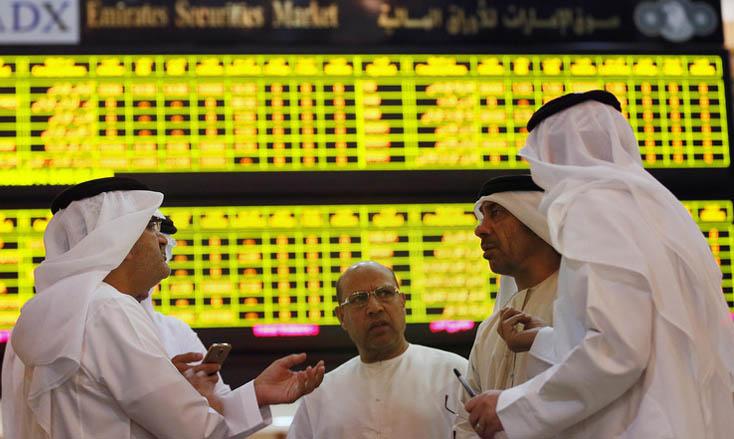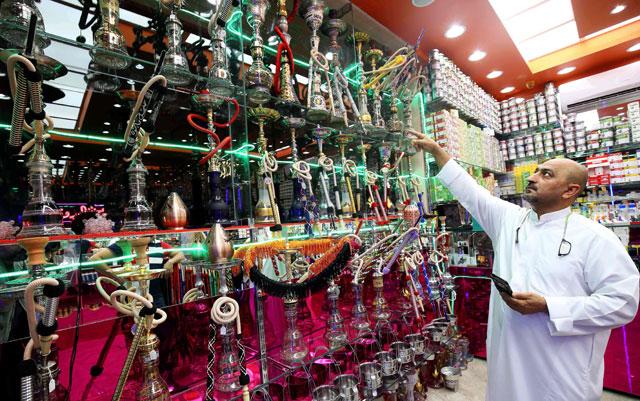You are here
Gulf states prepare for VAT in time of crisis
By AFP - Jun 22,2017 - Last updated at Jun 22,2017

Investors speak in front of a screen displaying stock information at the Abu Dhabi Securities Exchange (Reuters file photo)
DUBAI — Oil-rich Gulf countries, which for decades have attracted millions of foreign workers, thanks to their reputation as tax-free havens, aim to introduce value-added tax (VAT) in 2018 to plug budget gaps.
On top of administrative and technical hurdles, however, the project now faces an unprecedented diplomatic crisis after Saudi Arabia, the United Arab Emirates and Bahrain on June 5 severed all ties with Qatar, their partner in the Gulf Cooperation Council (GCC).
Saudi Arabia, the UAE and Qatar are due to introduce VAT in early 2018, with the other three GCC members — Bahrain, Kuwait and Oman — following at a later date.
In case of a prolonged crisis, Qatar would have to replace imports from Saudi Arabia and UAE, valued at $4.55 billion annually, with “costlier” non-GCC goods, said M.R. Raghu, head of research at the Kuwait Financial Centre.
“Implementing VAT in such a scenario would lead to inflationary pressures, especially in food-related items,” he said.
“If the crisis is prolonged, then Qatar might want to delay the implementation of this envisaged tax reform to balance any spike in prices of commodities in the local markets.”
If it goes ahead as planned, VAT is unlikely to tarnish the GCC reputation as a low-tax region or reduce its appeal to expatriates, according to Monica Malik, chief economist at Abu Dhabi Commercial Bank.
An introductory rate of 5 per cent “looks to balance raising government revenue and still having a very attractive business environment, both for expatriates and corporations”, she said.
“We believe the UAE and the Gulf will still overall be seen as a low-tax environment on a global basis.”
VAT, a tax paid by the consumer, is also unlikely to deter businesses from setting up operations in the Gulf region, according to Jeanine Daou, indirect tax leader at PwC Middle East.
“From a business perspective, VAT should be neutral. What businesses are required to do is to collect tax on behalf of the government on their sales... It is not a corporate tax,” she said.
She said that 5 per cent would be “one of the lowest VAT rates across the globe”.
Worries of wholesale trader
But in Dubai’s old souk, a wholesale trader disagreed, expressing fear of having to bear the VAT cost due to low profit margins.
“I think 5 per cent will be too much,” said Obaid Tahiri sitting in his household appliances shop.
“For wholesale, we don’t have 5 per cent profit. Clients will not pay... I cannot increase the price for the customer.”
Although the UAE has announced plans to introduce VAT in January next year, many wholesale traders in the souk seem unaware of it.
“Until now, the government has not told us anything about tax,” said Abdullah Al Marzouqi, another trader.
The introduction of VAT is part of measures being taken by the energy-rich monarchies to reduce dependency on oil revenue and to diversify income.
“The governments’ objective is to diversify their revenue sources. It is about fiscal sustainability for the future. So, implementing VAT is an important tool allowing government to generate more revenue,” said Daou.
Although the 5 per cent rate is unlikely to address the fiscal pressure faced by Gulf governments, “it is a tool for future fiscal sustainability”.
Malik said the introduction of VAT across the six nations is expected to provide revenues of up to 1.5 per cent of total gross domestic product.
“The aim is not to end the fiscal deficit. It is rather to deepen and widen non-oil revenue,” she said, noting that hydrocarbons still account for between 50 and 90 per cent of government revenues in GCC countries.
Related Articles
DUBAI — Hard hit by a drop in oil income, energy-rich Gulf states will next year introduce value-added tax (VAT) to a region long known for
A diplomatic split between Qatar and its wealthy Gulf neighbours may disrupt billions of dollars of investment in the region and slow efforts to make economies more efficient through trade and transport reforms.
DUBAI — A projected long-term drop in oil prices will drive fiscal reforms in energy-dependent Gulf states and spur public borrowing, Moody'












